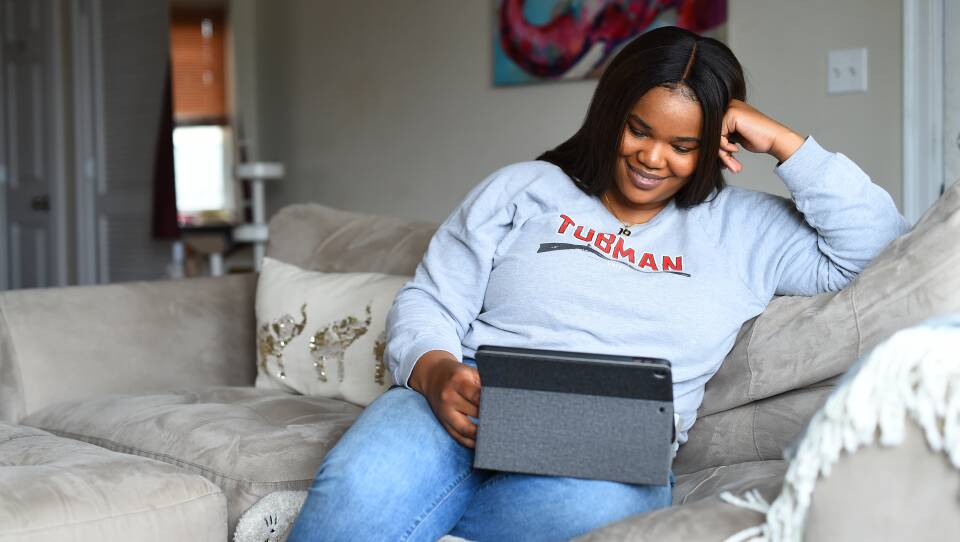On a weekend Zoom call, several dozen young black strangers cooked a budget-friendly brunch together. As Beyonce crooned in the background, the group followed the lead of a local chef, eggs sunny-side up to pair with roasted tomatoes and avocado toast. Once the food was done, they mixed drinks, then kicked back for a virtual day party.
Boston’s millennial leisure leaders are staging virtual events like that brunch-and-party as a way to safely recreate a vital social lifeline. The shift to virtual fun comes as the city begins to re-open despite the possibility of a resurgence in cases of COVID-19.
Farrah Belizaire, who normally runs a pop-up series of social events for black millennials in greater Boston, launched the enterprise in 2012 after repeatedly hearing that the area lacks enough spaces where the demographic can connect.
“Having a space where you don’t have to explain yourself, or you can relate to various challenges that we experience being underrepresented really, I think, provides that psychological safety,” Belizaire told WGBH News .
Ayanna Polk, who lives in Dorchester — one of the city’s hardest hit neighborhoods — said the virtual fun has been a “saving grace” for black millennials like herself who are contending with isolation while trying to slow the spread of the virus in their communities.
“When I’m in these social settings, I feel seen. I feel heard. I’m with people who can relate to my experience,” she said. “I know a lot of young professionals throughout the city are in places where they may not see themselves on teams or in leadership, so it can be culturally isolating.
“Having these events is a way to feel like you’re truly a part of a community,” she added.
Polk and other black millennials are planning to socialize exclusively from home this summer.
“I’m still definitely defaulting to virtual meetings. The only afterthought to that is protests,” said Nyasha Madziva, who’s originally from Zimbabwe. “Other than that, I’m still wary of going out to see people while we are still opening up. There’s no need to take unnecessary risk.”
Mothler Dalexis, a local DJ, agrees.
“For me, I still don’t think it’s quite safe,” said Dalexis, who pivoted in early March to exclusively playing virtual events," Dalexis said. "Despite missing the energy that comes from experiencing new people and new spaces, he said he is turning down inquiries to play at small graduation parties until he has more information and guidelines from public health officials.
“Because I think we still need to celebrate milestones [and] celebrate events, but in the back of my mind, I’m thinking about health and safety of myself, my family, and also of my clients that hire me."
Even though they’re not the hardest hit age group, Black millennials belong to one demographic targeted in early messaging to help slow the spread the coronavirus and another disproportionately represented in Boston’s COVID-19 cases and deaths.
Of the more than 13,000 confirmed cases in Boston with known race and ethnicity data, nearly 40 percent are black. Blacks also represent 35 percent of the city’s nearly 700 deaths, despite only being 25 percent of the population.
While the pandemic has made the adjustment to virtual interaction necessary for everyone, many black millennials are quarantining against the backdrop of a prevailing sense of isolation that can come from living in a segregated and notoriously insular city. Add the emotional toll of wide-spread outrage over the killings of unarmed black people, and virtual events have quickly become a critical social aid for this group.
“We’re in the age range where a lot of us have kids and also are around parents, so we’re around different generations of folks [who] we can carry things to,” said Sheena Collier, another black millennial events curator who has shifted to online platforms.
“People do like the events, but it’s not simply about the events,” said Collier, pointing to her bi-weekly virtual gatherings during the pandemic. She said she has recently received multiple requests for an event to help young black professionals deal with being bombarded with workplace questions and opinions on race.
“People want a space to talk through that,” she told WGBH News. “To vent about it and hold space for each other, and also come up with solutions.”
Belizaire added that the recent focus on racism and police brutality has made virtual connections even more important for helping young black people find support and foster resilience.
“For some people,” she said, “that means I’m still going to get up every day and try to live my best life and still celebrate my blackness with other people who I can celebrate in this same community.”
Polk, who said she hasn’t been out to socialize since early March, said she’s itching to go out again, but “being a black woman, I want to make sure I’m taking care of myself and I’m taking the due diligence to make sure that everyone around me is safe.”





